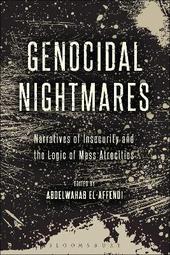
|
Genocidal Nightmares: Narratives of Insecurity and the Logic of Mass Atrocities
Hardback
Main Details
| Title |
Genocidal Nightmares: Narratives of Insecurity and the Logic of Mass Atrocities
|
| Authors and Contributors |
Edited by Professor Abdelwahab El-Affendi
|
| Physical Properties |
| Format:Hardback | | Pages:272 | | Dimensions(mm): Height 229,Width 152 |
|
| Category/Genre | Genocide and ethnic cleansing |
|---|
| ISBN/Barcode |
9781628920710
|
| Classifications | Dewey:303.6 |
|---|
| Audience | | Tertiary Education (US: College) | |
|---|
| Illustrations |
5 halftone illus
|
|
Publishing Details |
| Publisher |
Bloomsbury Publishing Plc
|
| Imprint |
Bloomsbury Academic USA
|
| Publication Date |
15 January 2015 |
| Publication Country |
United States
|
Description
This book offers a novel and productive explanation of why 'ordinary' people can be moved to engage in destructive mass violence (or terrorism and the abuse of rights), often in large numbers and in unexpected ways. Its argument is that narratives of insecurity (powerful horror stories people tell and believe about their world and others) can easily make extreme acts appear acceptable, even necessary and heroic. As in action or horror movies, the script dictates how the 'hero' acts. The book provides theoretical justifications for this analysis, building on earlier studies but going beyond them in what amount to a breakthrough in mapping the context of mass violence. It backs its argument with a large number of case studies covering four continents, written by prominent scholars from the relevant countries or with deep knowledge of them. A substantial introduction by the UN's Special Advisor on the Prevention of Genocide demonstrates the policy relevance of this path-breaking work.
Author Biography
Abdelwahab El-Affendi is Reader in Politics at the University of Westminster, UK. He is the author of Darfur: A Decade in Crisis (2013).
ReviewsCrossing disciplinary boundaries, Genocidal Nightmares deepens our understanding on how ordinary people can lend support to mass atrocities. The key contribution of this superbly edited volume is on the framing of historical and political grievances to create "narrative of insecurity" than can make acts of gross violence appear humane and righteous. With special sensitivity to the global rise of Islamophobia, this book will be of interest to students and scholars of genocide, human rights, terrorism, racism and political authoritarianism. Members of the broader reading public interested in these debates will benefit from this extremely timely and important intellectual contribution. * Nader Hashemi, Associate Professor, Josef Korbel School of International Studies, University of Denver, USA * The saddest comment on us as humans is that the narratives in this volume will come as news to so many of us. Even more disturbing is how much we need still to learn the most basic fact of life: all individuals-regardless of skin color, religious commitment, or culture-suffer alike. All bleed, all feel pain when mistreated, all grieve over the loss of loved ones, property, and personal freedom. The many excellent and wrenching discussions set forth by the authors of this volume drive home such basic facts. Would that their efforts be rewarded by such a volume never again needing to be written. Until that day, we must be grateful to each one of them for reminding us of what it means to be human. * Charles E. Butterworth, Professor, Department of Government and Politics, University of Maryland, USA * This engaging book explores how stories and ideas can poison minds and societies, turning us against one another as we become entangled in 'killer narratives.' But it also illuminates how we can prevent mass atrocities by strengthening shared identities that reject the politics of the machete, the concentration camp and the death squad. * Dr Simon Adams, Executive Director, Global Centre for the Responsibility to Protect, USA *
|